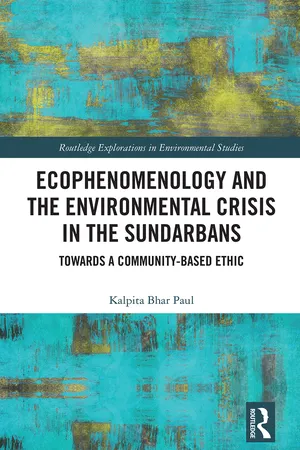
Ecophenomenology and the Environmental Crisis in the Sundarbans
Towards a Community-Based Ethic
- 184 pages
- English
- ePUB (mobile friendly)
- Only available on web
Ecophenomenology and the Environmental Crisis in the Sundarbans
Towards a Community-Based Ethic
About This Book
This book offers a philosophical analysis of the environmental crisis in the Indian Sundarbans, drawing upon phenomenological narratives. It nuances the present understanding of the crisis by introducing plurality in our metaphysical understanding of the environment and epistemological understanding of the human–environment relationship.
Contemporary research on the Sundarbans mainly focuses on the impending threat of climate change, natural disasters, as well as increasing human–animal conflict, conservation, and forest access debates, while scholarly works have mostly used environmental impact assessments to offer technocratic solutions that prioritize a particular type of human–environment relationship characterized by an "anticipation of ruin." Rather than rushing to find solutions, I embark on a journey to unpack the meaning of crisis through phenomenological narratives of human–environment relationships. A deep dive into the human–environment relationship through an intentional engagement with the work-worlds of islanders, the formation of a more-than-human community is revealed, giving rise to community-based ethic that transcends the poverty of thought and imagination in comprehending the crisis of the Indian Sundarbans. This new ethical framework emphasizes the co-emergence of self-consciousness and eco-consciousness, serving as a moral impetus for individuals to act ethically towards the environment. This approach impels us to rethink what the Sundarbans is, how the crisis gets manifested to the inlanders and outsiders, and what kind of procedural changes are required to protect the Sundarbans as a living ecosystem instead of a natural museum.
The book's phenomenological depth and engaged philosophical framework will elicit deep interest from within academia and among practitioners who are working in environmental studies, philosophy, human ecology, and island studies. The convergence of conceptual understandings and field narratives will also draw the interest of research students working in correlated fields.
Frequently asked questions
Information
Table of contents
- Cover
- Half Title
- Series
- Title
- Copyright
- Contents
- Acknowledgments
- 1 Introduction
- 2 Phenomenology of Land and Land-Eaters
- 3 Phenomenology of Land-Water-Scape
- 4 Place and “Replace”
- 5 Phenomenology of Accident
- 6 Saṃsāra and Community-Based Ethic
- 7 Community-Based Ethic and Pro-Environmental Behaviors
- 8 Beyond the Crisis of Imagination
- Appendix I: A Bit More on the Sundarbans
- Appendix II: Phenomenological Research Methodology
- Appendix III: Excerpt from Phenomenological Narratives
- Index